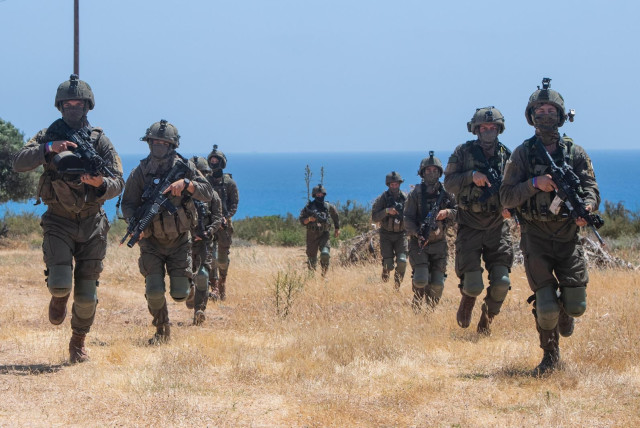IDF to Knesset: Deeply worried about the readiness for war

Air Force and military intelligence are the critical units that have been harmed most severely.
Senior IDF officers on Wednesday briefed two subcommittees of the Knesset Foreign Affairs and Defense Committee (FADC) on the military’s state of readiness as reservists continue to quit in protest over the government’s judicial reform.
One major message, similar to some public statements and to what has been leaked in other closed forums, is that the IAF and the Intelligence Corps are the main units being harmed in a way that most immediately impacts state security. In contrast, the Infantry Corps has been better able to adjust to losses of reservists due to its size and significantly more interchangeability of soldiers from different units.
The hearing was co-chaired by National Unity MK Gadi Eisenkot, a former IDF chief of staff; and Likud MK Shalom Danino, the FADC said in a statement.
Senior IDF officers gave a highly specific classified briefing about the IDF’s current and future readiness, the FADC said.
Judicial reform dispute threatens to endanger Israel's readiness for war
Other public and leaked statements from senior IDF officers have made it clear that they were deeply worried that war preparedness would plunge precipitously if the dispute over the judicial overhaul continues.
In addition, the FADC statement said the IDF brass had addressed how it was trying to counter the phenomenon of IDF reservists quitting.
Generally speaking, the IDF has tried to use a mix of public statements and one-on-one dialogues, warning that the reservists could undermine national security by quitting, which would leave the debate over the judicial overhaul obsolete, given that major losses in a war could overtake the whole issue.
On July 31, in a special closed-session at the General Staff Headquarters in Tel Aviv, Defense Minister Yoav Gallant told the FADC the IDF was still war-ready at the time, but that continued quitting by reservists en masse could erode that readiness in the medium term, such as in the fall.
At the end of July, no top defense officials had wanted to define what that time period would be. They said war-readiness was not a binary concept, with different units being at different states of readiness and distinct kinds of missions requiring more reservists, while others require less.
But even then, Gallant warned that if the cohesion of the IDF collapses, the situation could drastically worsen.
“The IDF is ready to accomplish its missions… The harm to readiness, so far, is defined [as somewhat contained], but there is a possibility that readiness will be harmed over the long term,” he said.
Furthermore, “many components of the country’s resilience are trending negatively, and the harm to national resilience could result in harm to national security,” he added.
Despite these warnings, Gallant also cautioned Israel’s enemies.
“Israel’s enemies are analyzing and learning from our internal events in Israel and believe, mistakenly, that this gives them the opportunity to exploit what they see as the State of Israel’s weakness,” he said, adding that they should still fear Israel’s military.
Senior IDF officers have repeatedly warned that Iran and Hezbollah believe they can push the IDF more in the current environment without too much of a reaction, as long as they keep the provocations below a certain level.
FADC chairman Yuli Edelstein (Likud) said: “In contrast to all kinds of media items claiming that we do not convene the committee – the committee already heard from the IDF chief… and now we hear the survey of the defense minister… and I am sure that we will continue our oversight.”
Though Edelstein was correct that Halevi spoke to the committee a few weeks before about the IDF’s readiness, and that Gallant was briefing them on July 31, Halevi’s briefing was primarily on other issues, with only a small part dedicated to IDF readiness.
Furthermore, Gallant’s briefing only occurred after the all-important vote repealing the reasonableness standard had already taken place.
In that sense, critics have said Edelstein avoided too much oversight or negative data from the IDF or Gallant during the period the vote was in the balance.
In addition, unlike previous FADC meetings that sometimes demanded certain actions, such as reducing or ending the Shin Bet (Israel Security Agency) surveillance of infected persons during the coronavirus crisis by certain benchmark dates, Edelstein announced no demands or benchmarks for changes in government policy if IDF readiness would drop below any specific measure.
Wednesday’s meeting also made no demands and set no benchmarks regarding the IDF or the judicial overhaul.
Jerusalem Post Store
`; document.getElementById("linkPremium").innerHTML = cont; var divWithLink = document.getElementById("premium-link"); if (divWithLink !== null && divWithLink !== 'undefined') { divWithLink.style.border = "solid 1px #cb0f3e"; divWithLink.style.textAlign = "center"; divWithLink.style.marginBottom = "15px"; divWithLink.style.marginTop = "15px"; divWithLink.style.width = "100%"; divWithLink.style.backgroundColor = "#122952"; divWithLink.style.color = "#ffffff"; divWithLink.style.lineHeight = "1.5"; } } (function (v, i) { });

